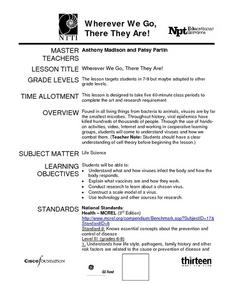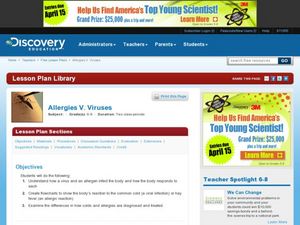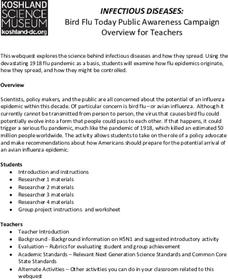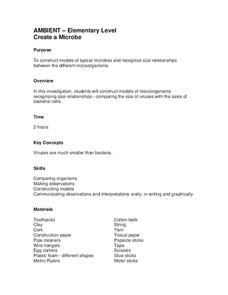Curated OER
Life Cycle - Human Biology
In this life cycle worksheet, 9th graders complete 3 different procedures that distinguish viruses and bacteria and inherited characteristics. First, they read the background excerpt given about bacteria and viruses. Then, students cut...
Curated OER
Tag, You're Sick
Students play a game to model how the immune system works. In this health and wellness lesson, the teacher explains how the immune system works, then students play a game of tag trying to stay away from germs, viruses, and bacteria and...
Curated OER
Fighting Back!
Fifth graders inspect the basic functions of the immune system and determine how viruses and bacteria invade the immune system. They also explore what happens to the immune system in outer space.
Curated OER
The Battle of the Guts
Young scholars listen to story, The Magic School Bus: Inside Ralphie, take notes from story on how body fights germs, identify different functions of immune system, and use Kid Pix slide show to explain how body fights viruses and bacteria.
Curated OER
Pandemic Flu
Students review the difference between viruses and bacteria, and provide examples of illnesses that each can cause. To help students comprehend how quickly an influenza infection can spread, they perform an activity. They are placed in...
Curated OER
Bioterrorism: Development of a "Superbug"
Students compare bacteria and viruses and their roles in biotechnology and bioterrorism. They outline fundamental steps of bacterial transformation and the possible selection processes to identify transformants. They discuss...
Howard Hughes Medical Institute
Viral Lysis and Budding
How do some viruses spread so quickly, and why do they make us feel terrible? Answer these (and many more) questions through a simple yet impactful lessons. Pupils observe demonstrations that show the two methods viruses use to escape...
Curated OER
Wherever We Go, There They Are!
The central video for this lesson is not available through the included resource link. However, the activity that simulates the passing of a virus through a population is impacting and the other resource links are invaluable. Use this...
Howard Hughes Medical Institute
Winogradsky Columns: Microbial Ecology in the Classroom
Winogradsky columns are ideal for observing the role of bacteria and other microorganisms in an ecosystem. This student activity guide is complete with data tables for observations and analysis questions for processing what was observed....
Center for Technology in Teaching and Learning
MedMyst Mission 1: Orientation at O.R.B.
A dozen years after a great plague wipes out the majority of Earth's civilization, a group of scientists joins together to fight infectious diseases. Scholars join the training mission and learn about viruses, bacteria, pathogens and...
Ask A Biologist
Viral Attack
Can you catch the same cold twice? Elementary and middle schoolers learn about what happens when a virus attacks their bodies, and how the immune system never forgets a virus, with an entertaining comic book. The packet includes...
Baylor College
The Variety and Roles of Microbes
Mini microbiologists play a card game in which they group microorganisms by groups: virus, fungus, protist, or bacteria. Then they identify the roles different microbes play in the natural world and explore how humans effectively use...
Curated OER
Using Mathematics to Explain the Spread of Diseases
Students use statistics to solve problems based on the spread of disease. In this disease lesson plan students study the role that viruses and bacteria play in the spread of diseases and explain pandemics.
Biology Junction
Bacteria Crossword Puzzle
In this biology instructional activity, students complete a crossword puzzle with 42 questions about bacteria. They identify the different characteristics of bacteria.
Curated OER
Bacteria
Learners study food borne illnesses and what foods are more likely to carry them. In this investigative lesson students examine harmful bacteria.
Curated OER
Allergies V. Viruses
Students examine how viruses and allergens affect the body. In this viruses lesson plan students create flow charts and examine the differences in how colds are diagnosed.
Curated OER
Viruses
In this virus worksheet, 9th graders study the graph shown that illustrates the sizes of viruses, bacteria, and other structures. Then they state how large a red blood cell is and how large the smallest viruses are that affect plants....
Curated OER
Medical Help for Microbe Attacks
Students discuss sicknesses and how medications have been designed to combat microbial illnesses. They review microbial groups and learn more about treatment of microbial illness. After viewing the lab students conclude that antibiotics...
National Academy of Sciences
Infectious Diseases: Bird Flu Today
Understanding how viruses spread has never been more important. A well-designed WebQuest lesson has young scientists research viruses, how they spread, and how they are treated. They also consider the trends in common viruses in the world.
Curated OER
Viruses and Simple Organisms
In this simple organisms worksheet, students review the characteristics of bacteria, viruses, parasites, monerans, and protists. This worksheet has seven matching, five true or false, five multiple choice, and four short answer questions.
Curated OER
Cold and Flus
Students investigate the difference between viral and bacterial illnesses. In this health instructional activity, students learn the symptoms of each and examine ways to prevent spreading virusus and bacteria.
Curated OER
Create a microbe
Students explore viruses and bacteria. They construct three dimensional models of microorganisms recognizing size relationships by comparing the size of viruses with the sizes of bacterial cells.
Curated OER
A Variety of Very Safe Veggies
Students study viruses and bacteria that can contaminate vegetables. They examine how vegetables can be preserved and what farmers might do to keep vegetables safe. They examine with pickling as a way to keep vegetable preserved safely.
Curated OER
How Do Antiretroviral Drugs Work?
For this biology worksheet, students watch a series of videos and complete 10 short answer questions right after. They explain how ART drugs interrupt the life cycle of HIV.

























